-
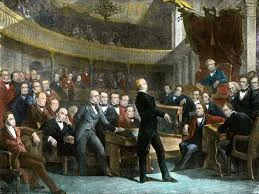 5 laws passed by the US Congress. Laws were passed to defuse tension between the North and South over slavery and territorial expansion. Proposed by Senator Henry Clay for the specifically the states California, New Mexico and Texas.
5 laws passed by the US Congress. Laws were passed to defuse tension between the North and South over slavery and territorial expansion. Proposed by Senator Henry Clay for the specifically the states California, New Mexico and Texas. -
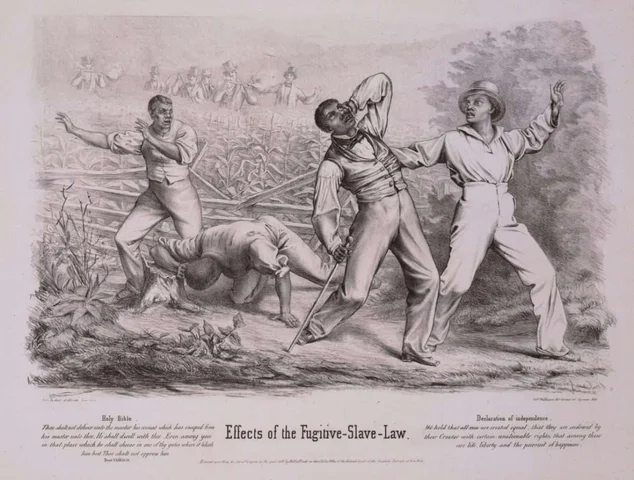 Nationwide Slave owners were allowed to reclaim their " property"of escaped enslave people to return to their owners. People were allowed to be captured even if they weren't a escaped slave.
Nationwide Slave owners were allowed to reclaim their " property"of escaped enslave people to return to their owners. People were allowed to be captured even if they weren't a escaped slave. -
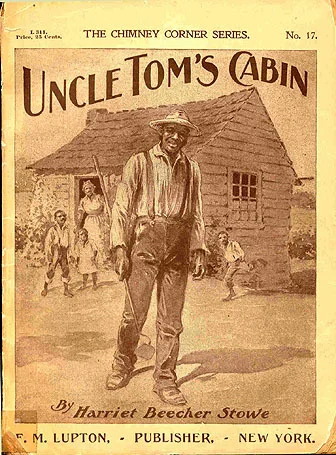 Written by Harriet Beecher, author and abolitionist. Started writing while her and her family lived in Brunswrick, Maine. She wrote to expose the brutality of slavery and to advocate for abolitionist.
Written by Harriet Beecher, author and abolitionist. Started writing while her and her family lived in Brunswrick, Maine. She wrote to expose the brutality of slavery and to advocate for abolitionist. -
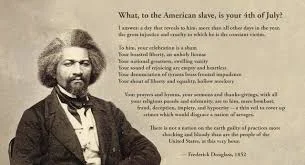 Fredrick Dougless said a speech that was said in New York to the Rochester Ladies Anti-Slavery Society. The speech was said to condemn the celebration of American Independence for its hypocity. The speech was told for him arguing that the "Fourth Of July" is a day of shame and mockery of enslaved people, as the "blessing of liberty" was not shred.
Fredrick Dougless said a speech that was said in New York to the Rochester Ladies Anti-Slavery Society. The speech was said to condemn the celebration of American Independence for its hypocity. The speech was told for him arguing that the "Fourth Of July" is a day of shame and mockery of enslaved people, as the "blessing of liberty" was not shred. -
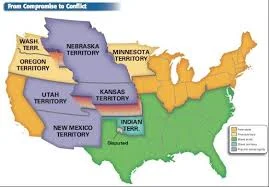 Introduced law by Stephen Douglass, a democratic senator from Illinois. Bill was placed to create territories of Kansas and Nebraska. Applied to the lands of the Louisiana Purchase. Goal was to organize the area of the transcontinental railroad.
Introduced law by Stephen Douglass, a democratic senator from Illinois. Bill was placed to create territories of Kansas and Nebraska. Applied to the lands of the Louisiana Purchase. Goal was to organize the area of the transcontinental railroad. -
Violent civil unrest between the anti-slavery and pro-slavery settlers, each side trying to control the territory's future. Happening in the main area of conflict, Kansas Territory. The Kansas-Nebraska Act repealed the Missouri compromise and introduced the idea of "popular sovereignty.
-
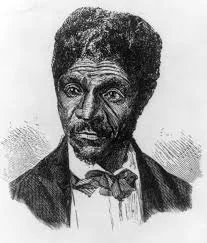 Dred Scott was a enslaved African American who sued for his freedom, his owner took him to live in territories where slavery was banned, he argued that these territories made him free. The court case was in Missouri but then reached the supreme court in Washington DC.
Dred Scott was a enslaved African American who sued for his freedom, his owner took him to live in territories where slavery was banned, he argued that these territories made him free. The court case was in Missouri but then reached the supreme court in Washington DC. -
John Brown and his fellow people seized the federal armory in Harpers Virginia by taking hostages and cutting telegraph lines. They hoped for slave up-rising and to end the institution of slavery but sadly the raid was a fail.
-
Abraham Lincoln and republican who got recognized for his debates with Stephen Douglass for the US Senate seat. These debates were held at the Republican National Convention in Chicago. Lincoln won presidency in 1860. His winning prompted the secession of southern states.The debate was also heavily influenced by the national debate over slavery.
-
SC was the first state to secede from the US. After Abraham Lincoln as president, which prompted a convention to vote for secession, dissolving the Union and declaring SC as an independent nation. The reason for this was the threat to the institution of slavery, which was important to SC
-
A breakaway nation formed by 11 southern states that seceded from the US. The seceded states covering the area that is now the southern US. The reason was the desire to preserve the institution of slavery.
-
Union Forces led by Robert Anderson, opened fire of Fort Sumter, on an island in Charleston Harbor, SC. Forcing surrender and marking the beginning of the American civil War. The cause was the secession of the Southern states from the union and their desire to take control of property.